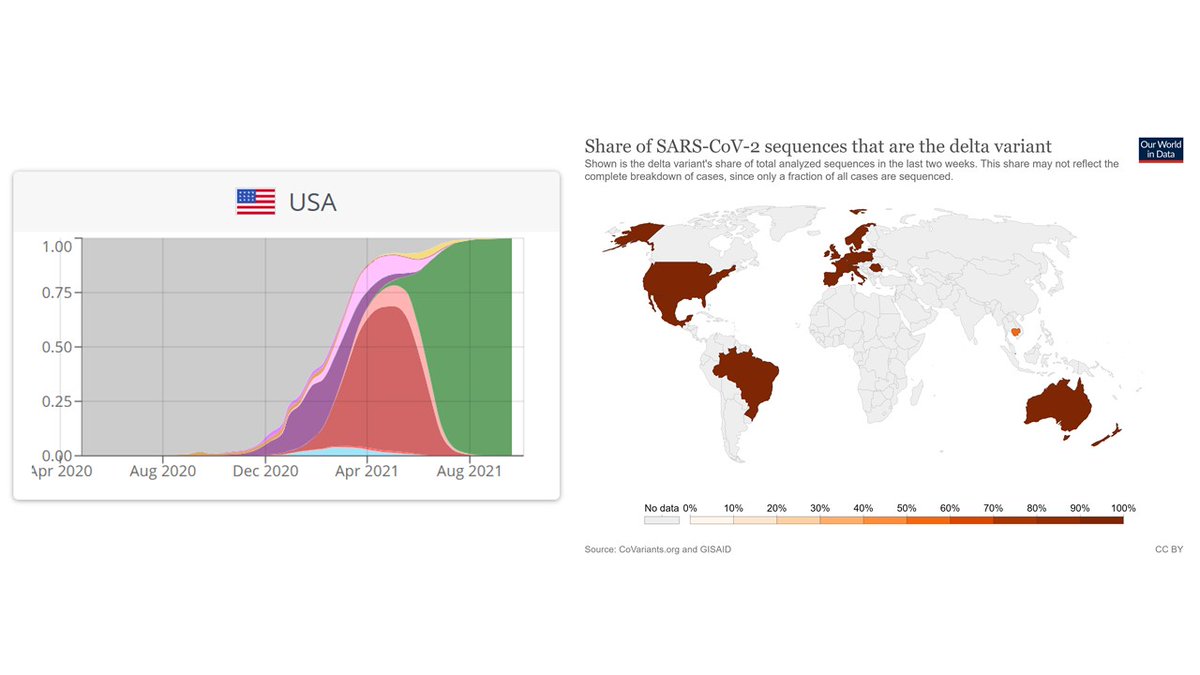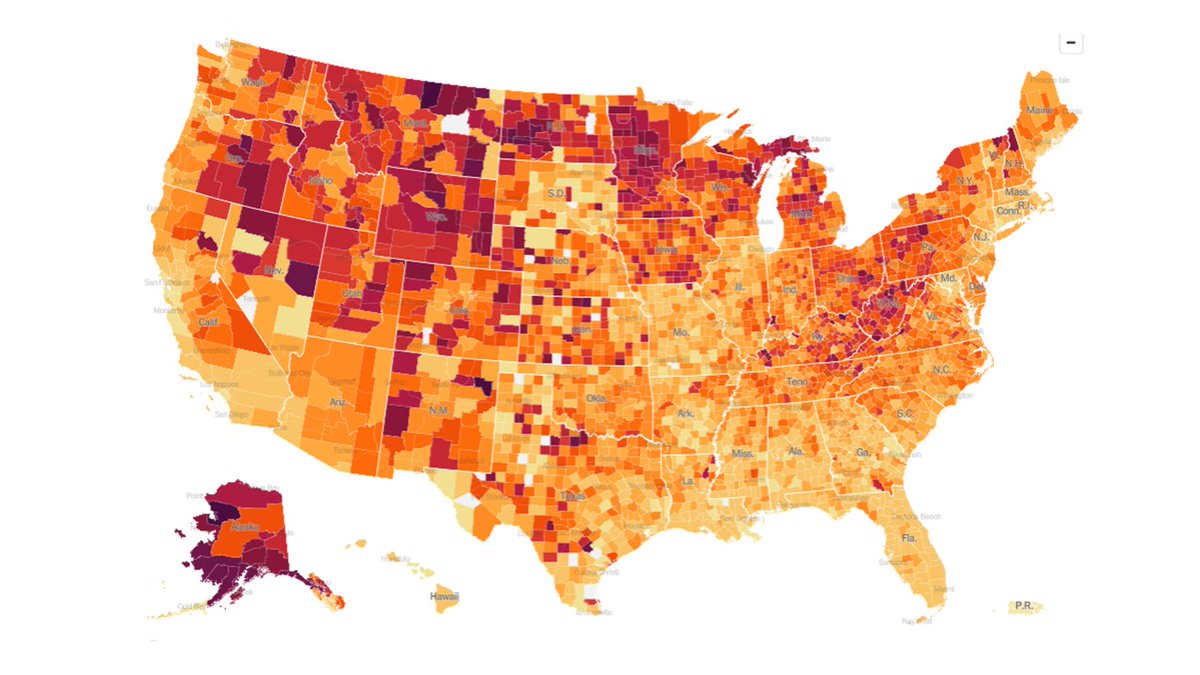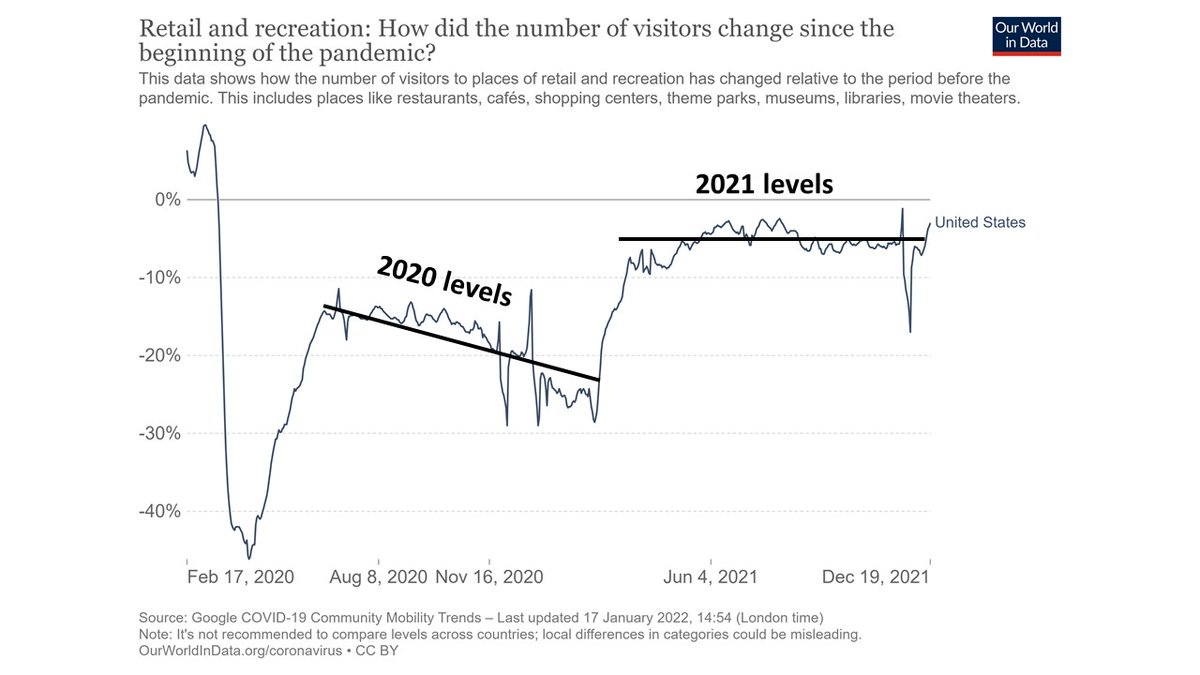I am optimistic that we will not see another big wave of COVID hospitalization & death in the USA.
Why?
Don't call it "herd immunity." But the vast majority of adults in the US have either been vaccinated or infected by now.
Thread on the US pandemic present & future...
Why?
Don't call it "herd immunity." But the vast majority of adults in the US have either been vaccinated or infected by now.
Thread on the US pandemic present & future...

First: What fraction of US adults have been vax'd or infected?
Estimated 1/3 infected by Dec 2020: go.nature.com/3vawFHb
20% of blood donors infected (+ 63% vax'd) by May 2021: bit.ly/3mPkr37.
So pre-delta, likely at least 1/3 of unvax'd adults had been infected.
Estimated 1/3 infected by Dec 2020: go.nature.com/3vawFHb
20% of blood donors infected (+ 63% vax'd) by May 2021: bit.ly/3mPkr37.
So pre-delta, likely at least 1/3 of unvax'd adults had been infected.

But 10m confirmed US cases (25% of total) have occurred since May - and most were in unvax'd adults.
Need to adjust for multiple infections, low testing in early 2020, etc.
But almost certain that >5% of US adults (=13m people) were infected in delta surge. Mostly unvax'd.
Need to adjust for multiple infections, low testing in early 2020, etc.
But almost certain that >5% of US adults (=13m people) were infected in delta surge. Mostly unvax'd.

So, among US adults, estimate:
66% fully vax'd
>10% more (1/3 of remainder) infected by Dec 2020
5% more infected by May 2021
>5% more infected during delta
5% more (1/3 of remainder) w 1 dose
Again, caveat of multiple infections, but likely ~90% of adults have some immunity.
66% fully vax'd
>10% more (1/3 of remainder) infected by Dec 2020
5% more infected by May 2021
>5% more infected during delta
5% more (1/3 of remainder) w 1 dose
Again, caveat of multiple infections, but likely ~90% of adults have some immunity.

Waning immunity could lead to more cases.
But for serious illness, vax effectiveness remains very high, even rising - see below from CDC (bit.ly/3oVG30s).
Similar effect likely from natural immunity - not 100% protective vs infection, but very good vs severe illness.
But for serious illness, vax effectiveness remains very high, even rising - see below from CDC (bit.ly/3oVG30s).
Similar effect likely from natural immunity - not 100% protective vs infection, but very good vs severe illness.

New variants can always emerge.
But despite 4 months of intense transmission, no new variants have been able to compete with delta - in the US or worldwide.
Virtually every COVID case is still delta.
And as transmission declines globally, fewer mutation events are happening.
But despite 4 months of intense transmission, no new variants have been able to compete with delta - in the US or worldwide.
Virtually every COVID case is still delta.
And as transmission declines globally, fewer mutation events are happening.

A new wave can start anywhere in the world.
(And the failure to share vaccines globally is a curse on our house as humanity.)
But other than in Eastern Europe, COVID deaths are largely falling worldwide. Even in places where our global vax response has been shameful.
(And the failure to share vaccines globally is a curse on our house as humanity.)
But other than in Eastern Europe, COVID deaths are largely falling worldwide. Even in places where our global vax response has been shameful.

Also encouraging: case rates are falling fastest in states (AL, FL, TN, MS) that had the worst delta surge.
While not rising much in states where vax levels are high.
This is what we would expect if immunity were playing an important role & vax effectiveness were holding.
While not rising much in states where vax levels are high.
This is what we would expect if immunity were playing an important role & vax effectiveness were holding.

Caveats:
1. Nobody can predict the pandemic future.
2. Kids are still at risk (though don't get as ill: bit.ly/3iYsMAs).
3. Trends reflect current behavior. If we relax too quickly, cases & deaths can rise again.
4. Outbreaks will occur among unvax'd. Keep vaccinating!
1. Nobody can predict the pandemic future.
2. Kids are still at risk (though don't get as ill: bit.ly/3iYsMAs).
3. Trends reflect current behavior. If we relax too quickly, cases & deaths can rise again.
4. Outbreaks will occur among unvax'd. Keep vaccinating!
In summary:
- More US adults were likely infected w delta than are still non-immune.
- Likely <10% of adults have no immunity.
- Immunity against serious illness is holding.
- No variants have replaced delta.
Meaning: any future waves will likely not be as bad as the last one.
- More US adults were likely infected w delta than are still non-immune.
- Likely <10% of adults have no immunity.
- Immunity against serious illness is holding.
- No variants have replaced delta.
Meaning: any future waves will likely not be as bad as the last one.
• • •
Missing some Tweet in this thread? You can try to
force a refresh















